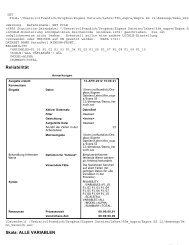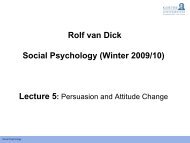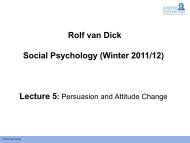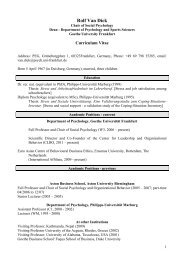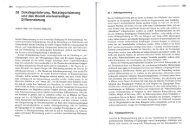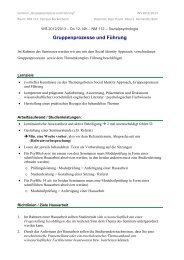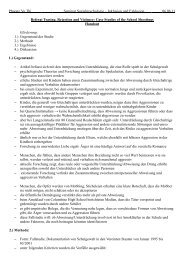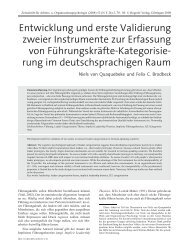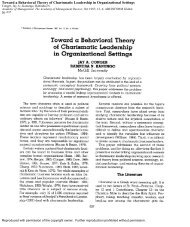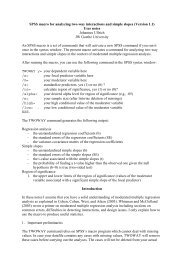Leadership-Interview-Transkript - Sozialpsychologie - Goethe ...
Leadership-Interview-Transkript - Sozialpsychologie - Goethe ...
Leadership-Interview-Transkript - Sozialpsychologie - Goethe ...
Sie wollen auch ein ePaper? Erhöhen Sie die Reichweite Ihrer Titel.
YUMPU macht aus Druck-PDFs automatisch weboptimierte ePaper, die Google liebt.
Rolf van Dick: Coming to your own personal styles of leadership, if you are inspired by these<br />
great people and try to be the leader that you just described to be effective yourself. What do<br />
you actually do? For example to maintain kindness in situations where you have to work with<br />
difficult people who are not kind?<br />
Michael West: You talked about my role as the executive Dean of the Business School. And<br />
for me that was an opportunity to try to put into practice the learning that I’ve derived from<br />
Psychology particularly over the years about what constitutes leadership and what constitutes<br />
an effective culture within organizations. So that was an amazing privilege to say well here is<br />
a laboratory of an organization with 200 people, with a turnover of 15 million Euro and let’s<br />
see what happens when you put this into practice. For me that was about making sure that<br />
there was a clear vision for the organization that we had clear objectives at every level. That<br />
the management team had clear objectives that the departments the teams the individuals all<br />
had clear aligned objectives about what we were seeking to achieve. Making sure that there<br />
was a climate within which people felt valued and respected and supported where we did a lot<br />
of appreciation, awards for being innovative or inspirational. I think if you give a lot of<br />
positive feedback to people, I think it’s very easy to give negative feedbacks; however there<br />
are some sorts of behaviors that are so contrary to the values and norms of the organization<br />
that if they are tolerated then they undermine the culture. And I think the mistake that we<br />
make in many organizations is we do not deal with the bad behavior in an effective way<br />
particularly when it is from senior staff. But my view has always been that when there is bad<br />
behavior that it is dealt with swiftly, immediately and decisively. And if the individual will<br />
not change the behavior, then they have to leave the organization. If you are not going to<br />
contribute to the community if you going to undermine the community trough being<br />
aggressive, dishonest or abusive then there is no place for you in the community ultimately. I<br />
think there are number of steps up to managing that exit about coaching people and giving<br />
people direction, but I think we have to be decisive in the end about saying that’s<br />
unacceptable and you can not be a part of the community. So there are two sides to this, you<br />
know. If you want to create a kind, positive and effective organization then there is a lots of<br />
great things you can do but the other side of that is you have to be very clear and very<br />
decisive about the behavior that go completely against the culture that you are trying to create.<br />
In my opinion in many organizations we failed to be decisive.<br />
Rolf van Dick: How do you think people can learn these qualities? Can we learn to become<br />
effective leaders in the sense that you just described? Or do some people have an edge for<br />
whatever reason.<br />
Michael West: My belief is that we can learn. I feel what I have done is to learn to become a<br />
little bit more effective over time. And I think that the things we have to put into operations<br />
are not complicated. We need to give people a clear direction we need to have clear direction<br />
in organizations and a big part of that is listening to what it is the people in the organization<br />
want to achieve what the organization wants to achieve. So the role of a leader is a lot of time<br />
listening and learning from the people he or she leads. Furthermore then helping to craft or<br />
sculptor direction which both meets the kind of environmental demands that are around there<br />
and reflex the values of the people within the organization. What we also need to do is to<br />
ensure that there are good relationships within organizations, in other words people are<br />
professional they work together well they get on. You talked about the coal mine which is a<br />
dreadful environment, but for me what made it very manageable were the amazing humor, wit<br />
and fun that the people had on the ground, as well as they were really looking after each other.<br />
It is about creating environments of good relationships were leaders also needed to spend a lot<br />
of time giving positive feedback. But that’s not about platitudinous that is about being




